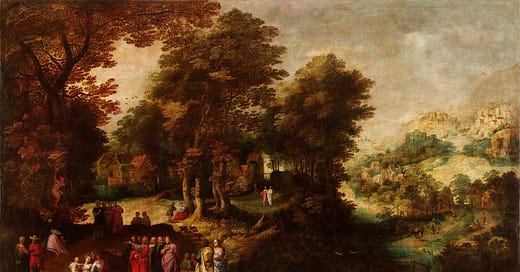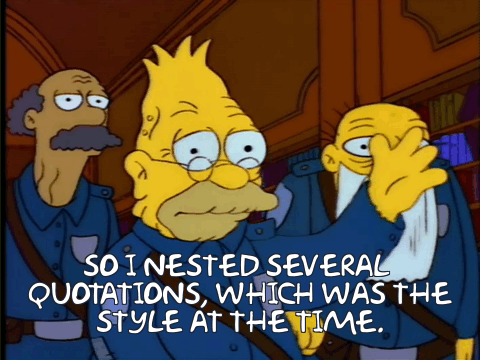When I was a little kid, I was a little kid—smaller than most of my classmates, including many of the girls. So I always had a special place in my heart for Zacchaeus. Having to climb up on stuff just to see what was going on is something I could relate to. I always loved the children’s song about him—
Reading 1
Rv 3:1-6, 14-22
I, John, heard the Lord saying to me:
To the angel of the Church in Sardis, write this:
The one who has the seven spirits of God and the seven stars says this: “I know your works, that you have the reputation of being alive, but you are dead. Be watchful and strengthen what is left, which is going to die, for I have not found your works complete in the sight of my God. Remember then how you accepted and heard; keep it, and repent. If you are not watchful, I will come like a thief, and you will never know at what hour I will come upon you. However, you have a few people in Sardis who have not soiled their garments; they will walk with me dressed in white, because they are worthy.” The victor will thus be dressed in white, and I will never erase his name from the book of life but will acknowledge his name in the presence of my Father and of his angels.
Whoever has ears ought to hear what the Spirit says to the churches.
To the angel of the Church in Laodicea, write this:
The Amen, the faithful and true witness, the source of God’s creation, says this: “I know your works; I know that you are neither cold nor hot. I wish you were either cold or hot. So, because you are lukewarm, neither hot nor cold, I will spit you out of my mouth. For you say, ‘I am rich and affluent and have no need of anything,’ and yet do not realize that you are wretched, pitiable, poor, blind, and naked. I advise you to buy from me gold refined by fire so that you may be rich, and white garments to put on so that your shameful nakedness may not be exposed, and buy ointment to smear on your eyes so that you may see. Those whom I love, I reprove and chastise. Be earnest, therefore, and repent.”
Behold, I stand at the door and knock. If anyone hears my voice and opens the door, then I will enter his house and dine with him, and he with me. I will give the victor the right to sit with me on my throne, as I myself first won the victory and sit with my Father on his throne.
Whoever has ears ought to hear what the Spirit says to the churches.
The nested quotations are kinda confusing. I’m not really sure why it’s written that way, other than it was the style of the time.
Anyway, John is passing along admonishments to the churches of Sardis and Laodicea. The lectionary brings these to us today, because the reminders are just as valid now as they were then.
Sardis was a heavily fortified city, which was said to be unbreachable. Which turned out not to be true, since Antiochus1 famously captured the city 600 years previous. The metaphor being that we can’t relax in the face of the enemy, but remain ever vigilant.
Laodicea was a wealthy city, famous for exporting fine garments and eye ointments. I have no idea what those two things have to do with each other, but John ran with them. These are people who’s lives are so free and easy, they don’t think they need God.
Meanwhile, I’m writing this in a coffee shop, where I can by a drink made of beans shipped from Central America, in a mug made in China, while typing on a machine built in Taiwan, using a language from Europe, writing anything I want under the protection of a legal system created hundreds of years ago. In all of that comfort and affluence, it’s easy to forget that we ultimate depend on God.
Responsorial Psalm
Ps 15:2-3a, 3bc-4ab, 5
R. (Rev. 3: 21) I will seat the victor beside me on my throne.
He who walks blamelessly and does justice;
who thinks the truth in his heart
and slanders not with his tongue.
R. I will seat the victor beside me on my throne.
Who harms not his fellow man,
nor takes up a reproach against his neighbor;
By whom the reprobate is despised,
while he honors those who fear the LORD.
R. I will seat the victor beside me on my throne.
Who lends not his money at usury
and accepts no bribe against the innocent.
He who does these things
shall never be disturbed.
R. I will seat the victor beside me on my throne.
Loving God can seem like a tall order, which I think is why Jesus commanded us to love our neighbor, as well. God loves them, and we should treat them in a way that reflects that.
Alleluia
1 Jn 4:10b
R. Alleluia, alleluia.
God loved us, and sent his Son
as expiation for our sins.
R. Alleluia, alleluia.
This is the ultimate dependency that John’s Revelation leads us to.
Gospel
Lk 19:1-10
At that time Jesus came to Jericho and intended to pass through the town. Now a man there named Zacchaeus, who was a chief tax collector and also a wealthy man, was seeking to see who Jesus was; but he could not see him because of the crowd, for he was short in stature. So he ran ahead and climbed a sycamore tree in order to see Jesus, who was about to pass that way. When he reached the place, Jesus looked up and said, "Zacchaeus, come down quickly, for today I must stay at your house."
And he came down quickly and received him with joy. When they saw this, they began to grumble, saying, "He has gone to stay at the house of a sinner."
But Zacchaeus stood there and said to the Lord, "Behold, half of my possessions, Lord, I shall give to the poor, and if I have extorted anything from anyone I shall repay it four times over."
And Jesus said to him, "Today salvation has come to this house because this man too is a descendant of Abraham. For the Son of Man has come to seek and to save what was lost."
This story is only found in Luke, as a contrast to the rich young man who didn’t want to give up his possessions2 (who does appear in all three synoptic Gospels). That’s the time Jesus said, “it is easier for a camel to pass through the eye of a needle than for a rich person to enter the kingdom of God.”
Which brings us back to today’s Gospel reading—Zacchaeus is a rich man who does pass through the eye of a needle, because of God’s grace. He doesn’t just pay back what he owes to his victims, but he tacks on interest!3
He hurt a lot of people. Asking forgiveness is the beginning of his entry into the Kingdom, but making reparations is the way Zacchaeus demonstrates his sincerity of heart.
Which is why we have penance after confession. Every sin is a sin against God, but most are also sins against our fellow humans. We owe reparations to our own victims, when possible, but we can never “pay back” God. Thus, we owe worship to God, while His forgiveness is something we can’t earn; thanks to Jesus’ sacrifice and through the Holy Spirit, it’s given freely, as grace.
What will we do with the grace given us in reconciliation?
Antiochus was the villain of Maccabees, if you remember the readings from around this time last year.
Sort of. Calculating compound interest and stuff wasn’t exactly common knowledge back then.




